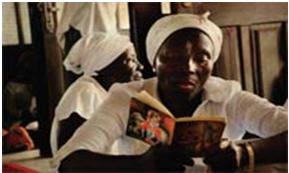By
Editorial Staff
Friday, July 09, 2010
INDONESIA : Businessman Devidas Hemrajani’s story is just one among the many Sindhis who have left their home country and now call Indonesia home.
Sixty years ago, Devidas arrived in Indonesia after months of traveling from Sindh, which is now a province of Pakistan. At the time, Sindh was being torn by often bitter conflicts between Hindus and Muslims.
Devidas, now 77, recalled that six months before he left, the Hindus in Sindh had already started their mass exodus in 1947, when the partition of India and Pakistan took place.
At the time, Devidas, along with his mother, sister and aunt, went to the train station where security officers asked them to put their belongings in the next train car. They were assured that the car would follow their own.
They never saw their belongings again. When they arrived in Mumbai, they were sent to a refugee camp where they were fed, clothed and sheltered over the next months, receiving better treatment than the people living near the camp.
“One morning, one of the guards asked me if I could write in English,” Devidas said. “I said yes. The next day, I was given the job of writing down food coupons for the refugees staying in the camp. To my dismay, they asked me to write fictitious names. I was aghast, the next day I quit.”
Devidas and his family eventually made their way to Singapore. A cousin in Jakarta then offered him a job, and although his mother was hesitant at first, she eventually gave Devidas her blessing.
After working several jobs in Jakarta, Devidas landed a well-paying job with Chotirmall, one of the biggest Sindhi companies in the city. Devidas worked at the company for 30 years, eventually leaving to start his own export business with his son.
Devidas’ story is not uncommon among the elder generation of Sindhis here. The Sindhis, with an estimated 10,000 families in Jakarta, are considered a minority within the larger Indian community here.
The word Sindhi is derived from Sindh, a province that was once part of India. In the 1947 partition of India by the British colonial rulers, Sindh, a Muslim majority province, became part of Pakistan. This resulted in an inflow of Muslim refugees from India, while many of Sindh’s Hindus made their way to India.
Jakarta’s Sindhi community is active in organizing events at every opportunity. This Thursday, for example, the community opened a three-day international gathering, the 17th International Sindhi Sammelan.
According to the Web site www.sindhisamelanjkt2010.org, the annual conference is a chance to bring together dispersed Sindhis, giving the community the chance to meet, network and interact.
Aside from helping Sindhis expand their business networks, the aim of the event is also to enhance knowledge of Sindhi culture and engage with the members of the community in a meaningful manner.
The first Sindhi-owned company in Indonesia was started by Wassiamall Assomull in 1865. When he went looking for employees, he turned to Hyderabad, Sindh, whose residents had a reputation for being honest and hard working.
The Sindhi community in Indonesia slowly grew with the arrival of the new workers, most of whom settled permanently in the country.
Some of them eventually set up their own businesses, and when India was partitioned in 1947, many went back to pick up members of their families and bring them to Indonesia.
Like Devidas, the partition paved the way for Kalu Metharam Bhagnani and his wife, Bhagwanti, to eventually settle in Indonesia. Both their fathers owned shops in East Java, one in Madiun and the other in Jombang.
When the partition happened, their families left their houses in Sindh and took the train to the nearby city of Jodapur, after which their fathers asked them to move to Indonesia.
When Kalu and Bhagwanti were rejoined with their families here, they adapted to the new way of life, but still managed to retain their culture.
Bhagwanti said that during those early years, “People were more loving. We would visit each other’s houses very often. People were very concerned with the kind of reputation they had.
“We had festivals where we toasted sweet chapatis [unleavened flatbread] and ate it cold and the married daughters were invited to the house for lunch to celebrate.”
As the Sindhi population steadily grew in Jakarta, they opened the Gandhi Memorial School. The Sindhis, realizing the importance of education as they made their way in their new country, even provided free education for children whose parents could not afford the school fees.
Over the years, the Sindhis found their place in Indonesia.
Sindhis like Raam Punjabi, who was a pioneer in the sinetrons, have played a major role in helping the local TV and film industry grow. Today, there are a number of major Sindhi film producers here.
While most Sindhis started in the textile and garment industries, like Haru Mahtani, today they are involved in a wide range of activities and businesses.
As Tourrmal Basssarmal Bhojawani, a Sindhi, puts it: “We may have lost our motherland, but destiny gave us a fatherland, where we have become proud citizens of Indonesia. Thank you, destiny!”
























































